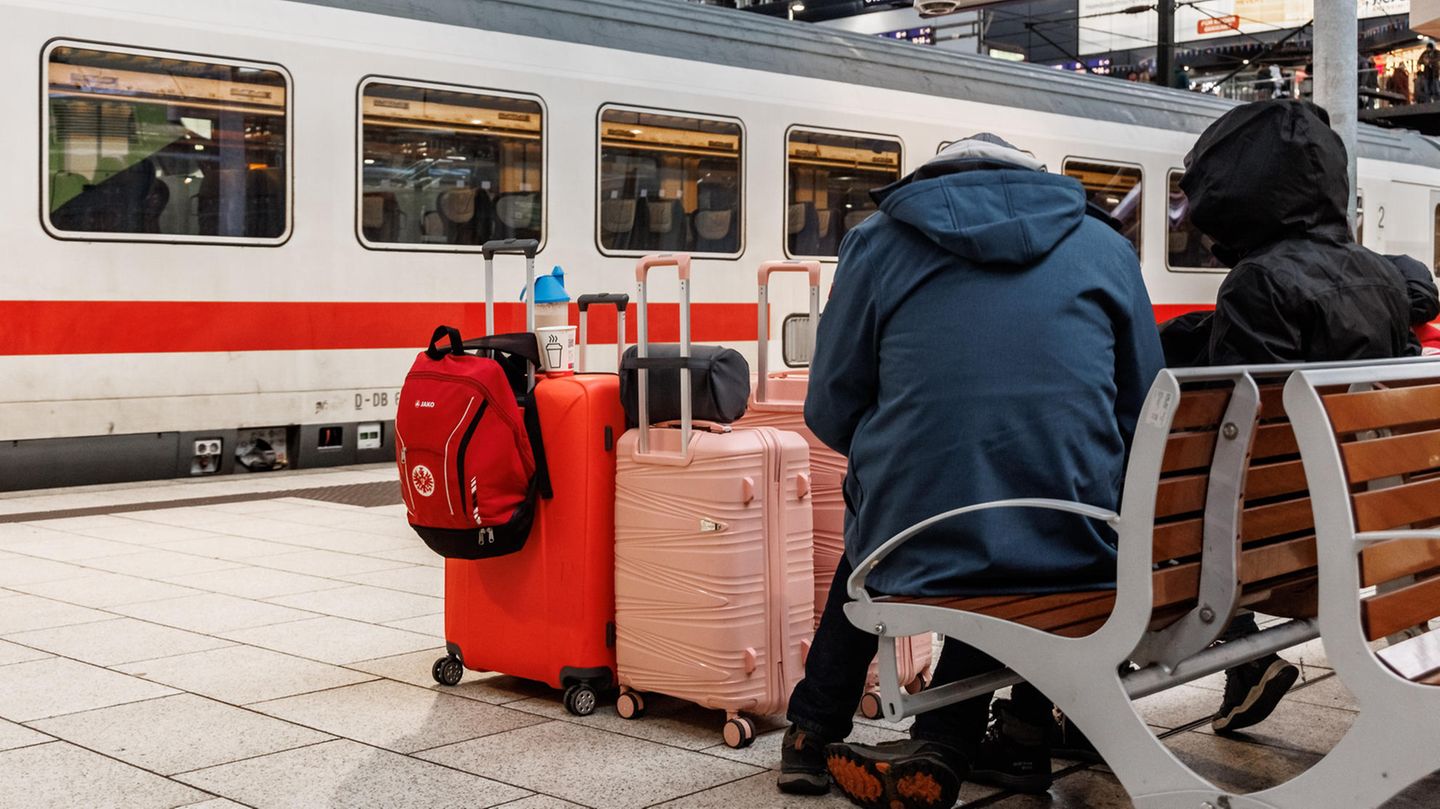The train drivers at Deutsche Bahn want to strike for six days – it would be a record strike. This goes too far, many newspapers say – but there are also other press opinions.
136 hours of strike – the German Locomotive Drivers’ Union (GDL) has never called for such a long industrial dispute on the railways during the term of office of its boss Claus Weselsky. The longest GDL strike to date in passenger transport paralyzed large parts of rail traffic in Germany for 127 hours in 2015. From Wednesday, commuters and weekend trippers will once again have to prepare for significant restrictions for almost a full six days. The strike in freight transport begins on Tuesday evening.
It is the fourth industrial dispute in the ongoing collective bargaining dispute and the first that is expected to last a full weekend. Thousands of trips are likely to be canceled again. The conflict between the railways and the GDL has been going on since the beginning of November. After the second round of negotiations, the GDL declared the talks had failed. There have been no negotiations since November 24th. After a strike vote among the GDL members, indefinite strikes are also possible.
Commuters all over Germany are unlikely to be happy about the news. The press is also not enthusiastic about the new strike – but they also defend the GDL. The press response:
“Other unions should learn a lesson from the GDL”
“Frankfurter Rundschau“: “Six days of strike – with such massive industrial action announcements, the disputers in other industries would probably negotiate hectically behind the scenes in order to cushion the consequences of the strike: for the reputation of Bahn and GDL, but also for the acceptance of industrial action in general. The right to strike is a valuable asset. The following applies to many industries: it is rarely used. One could also say: There are far too few strikes in Germany. Employees in other sectors and their unions should therefore learn a lesson from the GDL, which has achieved a lot for its people in the past. But the GDL has to be careful not to overdo it. Strikes should be a given, but so should negotiating with one another. The GDL’s refusal makes it easy for the railway board to pass on responsibility for the standstill to the union. Will that change soon? Commuters and travelers should not rely on this.”
“Straubinger Tagblatt“: “It doesn’t help: an agreement has to be found somehow, and that can only be done at the negotiating table. The railway will have to offer Weselsky more. The strike leader must also move. Of course, the employees are not to blame for the railway’s staff shortage. But it is a fact that must be taken into account in a financial statement.”
“Rhine Palatinate“: “The collective bargaining autonomy enshrined in the Basic Law is a valuable asset worth protecting. It gives unions and employers the right to negotiate employees’ wages and working conditions free from state influence or even coercion. As with any right, collective bargaining autonomy also comes with responsibility. (…) The GDL’s actions have less and less to do with responsible tariff policy, which should also take the consequences for the general public into account, especially in an area such as rail transport. On the backs of millions of rail customers and without considering the economic consequences, the GDL is trying mercilessly to enforce its positions – in particular the demand for shorter weekly working hours for shift workers. A return to the negotiating table is being refused, as is an arbitration procedure demanded by many sides. Anyone who acts like this exposes themselves to the suspicion of seeking conflict primarily for the sake of conflict.”
“GDL punishes people who have nothing to do with the industry”
“The bell“: “Of course the right to strike is a valuable asset, and strikes have to hurt, otherwise they would be useless. In the case of the GDL strike, however, it is once again not primarily the ‘collective bargaining partner’ – the word sounds like mockery given the mutual warm dislike – DB who is suffering pain. Rather, there are millions of commuters, holidaymakers and weekend travelers. The fact that GDL boss Weselsky largely paralyzed rail traffic for six days is outrageous. Should this continue forever? According to the motto: DB doesn’t meet all of our demands in one offer – so we’re on strike!? Maybe soon for weeks? Without even negotiating?”
“Central German newspaper“: “The GDL boss holds countless people jointly liable who have nothing to do with his industry. And if the company largely fulfills his wishes, it will already make his successor bigger. Because he will want to step out of the shadow of the GDL boss. Weselsky forgets: Employers are fundamentally not enemies. The railways aren’t the only place where workers are needed. A 35-hour week with full wage compensation is difficult to fit into a time that is crying out for a new beginning in view of a massive reform backlog. The GDL should also think about this.”
“Leipziger Volkszeitung“: “Over ten percent more wages, working one hour less without loss of income – two hours are still missing from the GdL claim. But the small GdL is once again setting the course for a strike. This is excessive. Here the Saxon is holding countless people jointly liable who have nothing to do with his industry, but just want to get from A to B.”
“People’s voice“: “Need and misery are siblings at Deutsche Bahn. Because of the new GDL strike, emergency timetables have to be worked on again, this time for six days – from Wednesday to Monday. Nevertheless, hundreds of thousands of rail customers will be in dire straits. With limited offerings, they don’t know how to get from A to B. The usual misery of the railway takes a short break: the desolate rail network, the terrible punctuality rate, the lack of staff. This happens because the railways have the power and opportunity to go all out in their collective bargaining dispute. Led by a union boss for whom the railway is a “juice shop” anyway. The main point of contention in the rail tariff universe is a reduction in working hours to 35 hours per week with full wage compensation. In East Germany, two thirds of all employees work without collective agreements. This industrial dispute must seem like something from another world to them.”
Source: Stern




